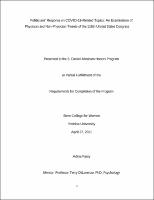Please use this identifier to cite or link to this item:
https://hdl.handle.net/20.500.12202/6880| Title: | Politicians' Response on COVID-19-Related Topics: An Examination of Physician and Non-Physician Tweets of the 116th United States Congress |
| Authors: | DiLorenzo, Terry Passy, Adina |
| Keywords: | Covid-19 Twitter feeds social media response to pandemic communication elected officials physician members of Congress Center for Disease Control (CDC) 116th U.S. Congress |
| Issue Date: | 27-Apr-2021 |
| Citation: | Passy, A. (2021, April). Politicians' Response on COVID-19-Related Topics: An Exa.mination of Physician and Non-Physician Tweets of the 116th United States Congress [Bachelor's honors thesis, Yeshiva University]. |
| Abstract: | In times of a public health crisis like the COVID-19 pandemic, effective and accurate communication by elected officials is imperative, particularly for those officials with a healthcare background. This thesis attempts to characterize the online behavior of members of the United States 116th Congress during the pandemic, with an emphasis on those who are physicians or other doctoral-level healthcare professionals. Social media has become an important form of communication, with Twitter being one of the leading social media sites. Twitter outputs of 527 members of the 116th United States Congress between January 1, 2020 and August 17, 2020 were analyzed. Of the 527 members of Congress, 26 (5%) possess a doctoral-level healthcare professional background and 17 (65%) of those hold an M.D. 23 (88%) of those are Republican, and 25 (96%) of them are male. Advocacy for mask wearing by the public as well rates of dissemination of COVID-19-related medical misinformation among members of Congress was examined. Medical misinformation included advocacy for off-trial use of therapies or preventative measures not recommended at that time by either the Centers for Disease Control (CDC) or the Food and Drug Administration (FDA). With respect to advocacy for appropriate face-covering utilization following CDC guidance: Non-physician members of Congress were significantly more likely to advocate for mask usage than physician members of Congress. Republican members of Congress were more likely to promote or share posts with medical misinformation than their Democratic counterparts. Given that almost all of healthcare-professionals in Congress were affiliated with the Republican party, medical misinformation was disproportionately promoted by healthcare-professional members of Congress compared to those without a healthcare background. Physician-members of Congress had higher rates of social media posts with content relating to medical misinformation, at a rate greater than baseline partisan divides would suggest. |
| Description: | Senior honors thesis / Open access |
| URI: | https://hdl.handle.net/20.500.12202/6880 |
| Appears in Collections: | S. Daniel Abraham Honors Student Theses |
Files in This Item:
| File | Description | Size | Format | |
|---|---|---|---|---|
| Passy Adina OA Politicians response 2021April.pdf | 239.54 kB | Adobe PDF |  View/Open |
This item is licensed under a Creative Commons License

